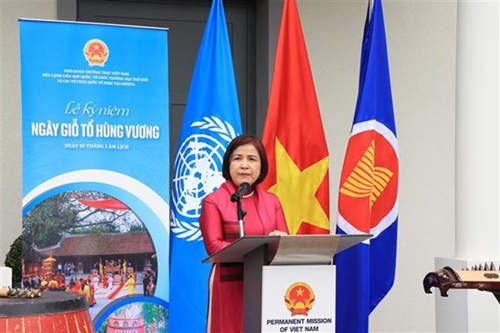The event saw Ambassador Le Thi Tuyet Mai, head of the mission; Chief Justice of the Supreme People's Court Nguyen Hoa Binh, who is on a working trip to the Swiss Federal Supreme Court and the World Intellectual Property Organization (WIPO), Vietnamese Ambassador to Switzerland Phung The Long, representatives of the Vietnamese Association and overseas Vietnamese in Switzerland.
    |
 |
|
Ambassador Le Thi Tuyet Mai speaks at the event. |
Addressing the ceremony, Ambassador Mai said the Death Anniversary of Hung Kings is an opportunity for Vietnamese people around the world to pay tribute to Hung Kings, ancestors and forerunners who fought evaders and defended the country.
She highlighted that the Party and State's guidelines and policies consider the overseas Vietnamese community an integral part of the nation, and appreciate the people's dedication to the homeland.
The Vietnamese communities in Laos, Thailand and Russia have held ceremonies to commemorate the Death Anniversary of Hung Kings with traditional rituals.
Legend has it that Lac Long Quan (real name Sung Lam, son of Kinh Duong Vuong and Than Long Nu) married Au Co (the fairy daughter of De Lai). Au Co then gave birth to a pouch of 100 eggs, which hatched into a hundred sons. However, soon thereafter, Lac Long Quan and Au Co separated. Lac Long Quan went to the coast with 50 of the children, while Au Co went to the highlands with the rest.
Their eldest son was made king, who named the country Van Lang and set up the capital in Phong Chau (modern-day Viet Tri city in Phu Tho province), beginning the 18 reigns of Hung Kings.
The kings chose Nghia Linh Mountain, the highest in the region, to perform rituals devoted to rice and sun deities to pray for bumper crops.
To honor their great contribution, a complex of temples dedicated to them was built on Nghia Linh Mountain, and the 10th day of the third lunar month serves as the national commemorative anniversary for the kings.
The worshiping of Hung Kings, closely related to the ancestral worship traditions of most Vietnamese families, was recognized as part of the Intangible Cultural Heritage of Humanity by UNESCO in 2012.
Source: VNA